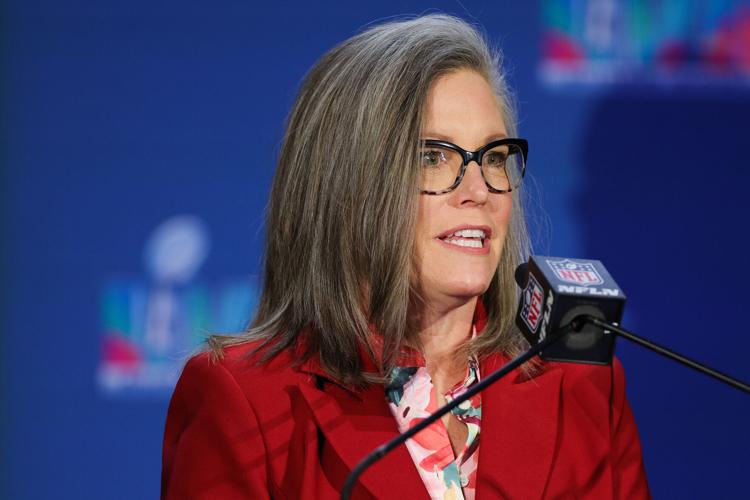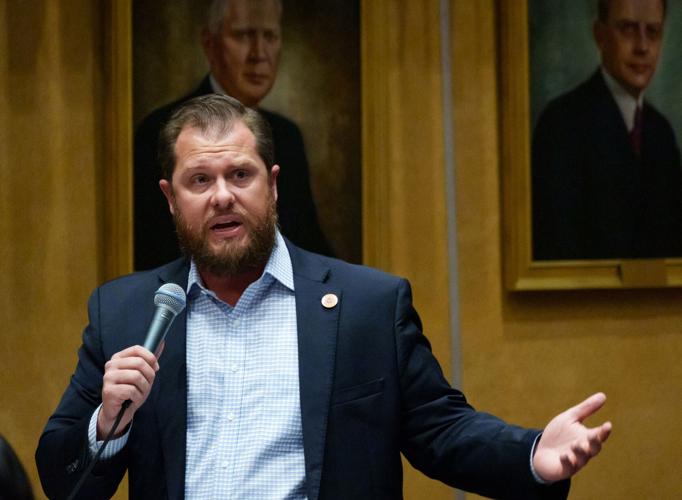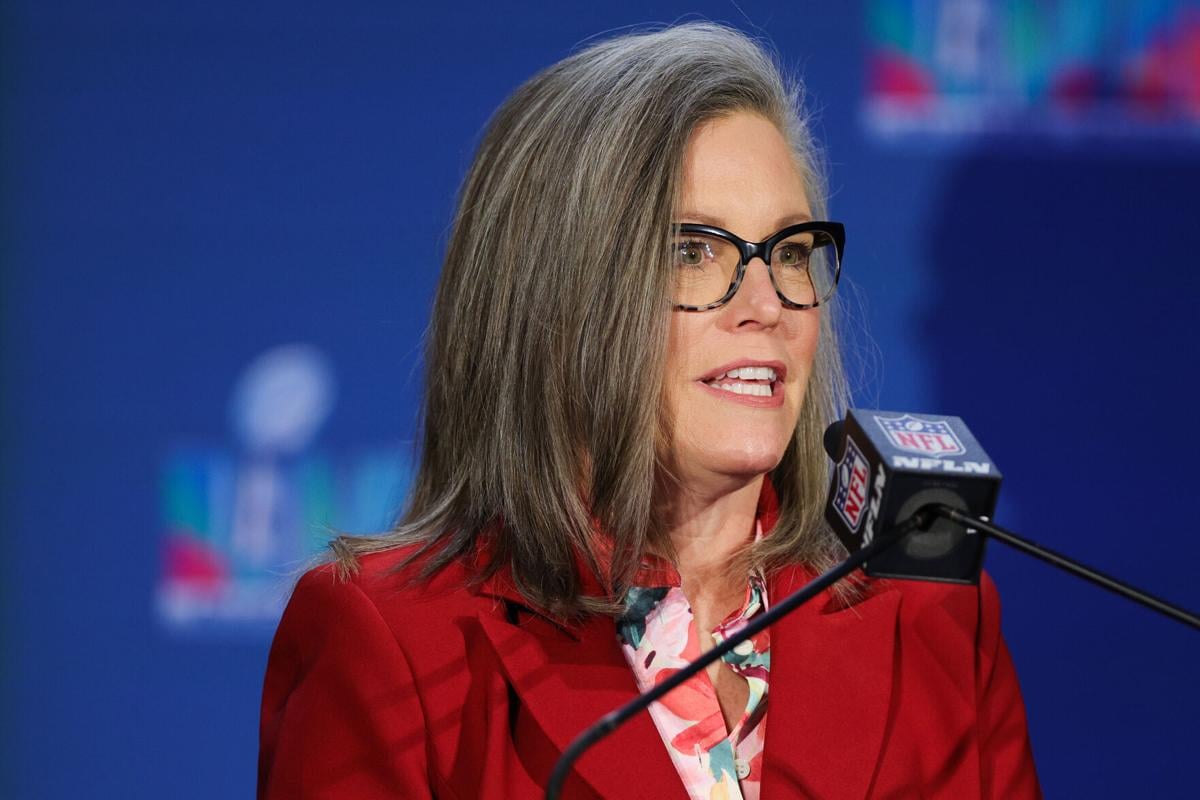PHOENIX — Gov. Katie Hobbs is claiming credit for a $260 million tax rebate to families that she didn’t want in the state budget.
And she is doing so despite the fact the law sending up to $750 back to Arizona taxpayers with dependent children was written in a way designed to preclude her from taking credit.
The Democratic governor issued a press release Tuesday announcing “Governor Hobbs puts money back into Arizonan’s pockets.’’
There’s also a video of Hobbs talking about the rebate.
“I made a promise that when I took office, I would take every opportunity I had to make it easier for Arizonans to provide for their families,’’ Hobbs says in the 50-second message. “I am so pleased to deliver this relief.’’
Sen. Jake Hoffman, a Queen Creek Republican who chairs the Arizona Freedom Caucus that came up with the rebate idea, said much of what Hobbs is doing appears to get around the restrictions put into the law. She went over the legal line, he said, when her Department of Revenue sent a letter to eligible recipients directing them to the governor’s website for more information.
“Unfortunately, Katie Hobbs has once again violated state law,’’ Hoffman told Capitol Media Services. “We’re exploring our legal options.’’
“We’re in compliance with all laws,’’ countered gubernatorial press aide Christian Slater.
“She’s proud”
Hobbs’ spokesman does not dispute that she never wanted the one-time rebate that goes out to all children with families, regardless of need.
Hobbs instead sought a permanent child tax credit that would have given low-income parents $100 a year for each child, a program with a $50 million price tag. That proved to be a non-starter with the Republican-controlled Legislature.
But Slater said Hobbs is entitled to claim credit for the rebate she didn’t want.
“This is part of the bipartisan budget that the governor signed,’’ he said. “And she’s proud to be putting money into Arizonans’ pockets.’’

Sen. Jake Hoffman
The rebate stems from the fact that budget projections showed the state ending the year with a $2 billion surplus. The final deal for the $17.8 billion budget involved essentially dividing up the excess for one-time programs.
Hobbs and Democrats got a $300 million infusion into public schools. There was also $150 million put into the Housing Trust Fund.
Republican lawmakers created a laundry list of one-time spending projects, ranging from $89 million to help complete the widening of Interstate 10 from Chandler to Casa Grande, to smaller earmarks for road improvements and traffic circles, to new substations for police and sheriff’s departments. There was $15.3 million tagged for capital costs at the Prescott Frontier Days Rodeo.
What’s at play here is that a group of GOP legislators in the Freedom Caucus, a group of conservative lawmakers, pooled their allocations for a one-time tax credit of $250 for each child younger than 17 and $100 for dependents 17 and older — with no age limit — though the number of credits is limited to three dependents. Nearly 750,000 families are eligible.
Letter of the law
The proponents inserted language in the legislation designed to keep the Democratic governor from taking credit.
“No letter relating to the Arizona families tax rebate issued under this section shall be sent from the governor’s office, be sent on the governor’s letterhead or reference the governor’s office,’’ the law reads.
And, strictly speaking, there is no such letter — from the governor.
Instead, there is one signed by Rob Woods, her hand-picked director of the state agency that is processing the rebates.
It never mentions Hobbs by name, or her office. Instead it tells recipients the rebate is “a result of this administration’s 2023 bipartisan budget.’’
“And we could not be more excited to put money back into your pocket,’’ it reads.
Where it really crossed the legal line, said Hoffman, is that the letter directs taxpayers to the governor’s website, which he said is a clear “reference to the governor’s office’’ that the law prohibits.
He did not say what legal options lawmakers have.
But Hoffman apparently was pleased, at least a bit, by Hobbs’ decision to now take credit for the cash going out. He said it proves that he and his supporters were right in the first place.
“Despite her initial lack of support for the Arizona Freedom Caucus’ tax rebate during budget negotiations, I’m happy she now sees how conservative policy is helping everyday families,’’ he said. “And given her newfound support for our policy agenda, she can expect to see much more of it when the Legislature reconvenes in 2024.’’
Budget deficit now expected
The chances of another rebate, however, are not good.
Recent latest projections show state expenses for the current fiscal year that began July 1 are running about $400 million ahead of anticipated revenues. And legislative budget analysts are saying there could be another $450 million of red ink in the next fiscal year.
The rebate itself cannot be blamed for the current deficit as the deal between Hobbs and GOP lawmakers let each side divide up the surplus. If members of the Freedom Caucus had not pooled their allocations for the rebate, those dollars likely would have been spent on other one-time projects.
As to the actual cause of the deficit, Hobbs is blaming it, at least in part, on the rising costs of a law that provides vouchers to attend private and parochial schools to all who want them. That has a big effect when parents who already were paying themselves to send their children to those schools now decide to seek one of the $7,300 vouchers.
But the real hit came with implementation of a flat individual income tax rate initially approved in 2022, a move that, by itself, will bring in about $500 million less this year than anticipated. Sales tax revenues, linked to consumer spending, also are now expected to come in roughly $240 million below estimates.
The tax rebate
As for the child tax credit, eligible taxpayers need not apply, as the Department of Revenue is figuring out who is entitled to a check or a direct deposit.
Not everyone with kids will get a rebate.
Only those who claimed a dependent tax credit on their 2021 full-year Arizona resident individual income tax returns can get a payment. They also had to have paid at least $1 of Arizona individual income tax on that 2021 return, or paid at least $1 in 2019 or 2020 under the same filing status as their 2021 return.
That also means someone who claimed a dependent in either 2019 or 2020 but not in 2021 because the child had left home is ineligible.
The law is worded in such a way that it disqualifies those who are generous with certain donations.
Arizona law provides dollar-for-dollar credits against state income taxes for contributions to certain causes. These include organizations that provide scholarships for students to attend private schools, money given to public schools for extracurricular activities, and funding for a host of other eligible charitable programs ranging from Adopt-A-Vet to the Yuma Community Food Bank.
These donations, however, often can wipe out someone’s state income tax liability. And that means they are ineligible for the rebates.
Get your morning recap of today's local news and read the full stories here: tucne.ws/morning






